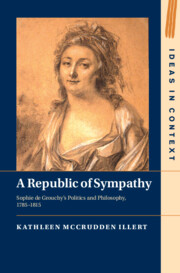Book contents
- A Republic of Sympathy
- Ideas In Context
- A Republic of Sympathy
- Copyright page
- Dedication
- Contents
- Acknowledgements
- Abbreviations
- Introduction
- Chapter 1 The Letters, 1786
- Chapter 2 The Wheel, 1785–1789
- Chapter 3 The Revolution, 1789–1793
- Chapter 4 The Republic, 1791–1793
- Chapter 5 The Publication, 1794–1799
- Chapter 6 The Mask, 1799–1804
- Chapter 7 The Poet, 1804–1810
- Chapter 8 The Thread, 1798–1815
- Conclusion
- Appendix: Attributions
- Bibliography
- Index
Chapter 5 - The Publication, 1794–1799
Published online by Cambridge University Press: 18 December 2024
- A Republic of Sympathy
- Ideas In Context
- A Republic of Sympathy
- Copyright page
- Dedication
- Contents
- Acknowledgements
- Abbreviations
- Introduction
- Chapter 1 The Letters, 1786
- Chapter 2 The Wheel, 1785–1789
- Chapter 3 The Revolution, 1789–1793
- Chapter 4 The Republic, 1791–1793
- Chapter 5 The Publication, 1794–1799
- Chapter 6 The Mask, 1799–1804
- Chapter 7 The Poet, 1804–1810
- Chapter 8 The Thread, 1798–1815
- Conclusion
- Appendix: Attributions
- Bibliography
- Index
Summary
Chapter 5 explores the context and reason for the publication of the Letters on Sympathy in 1798 as an accompaniment to her translation of Smith’s Theory of Moral Sentiments. For Grouchy, the Terror and the fall of Robespierre were personally traumatic and led to her decision to divorce Condorcet shortly before his death. However, these events did not introduce any major changes to her philosophy. Deprived of her key intellectual partner, she attempted (more or less unsuccessfully) to recreate the partnership she had shared with Condorcet with her lover, Maillia Garat, and her brother, Emmanuel de Grouchy. Moreover, the publication of the Letters was intended to be a reminder of the ideals of the early revolution, in the face of the increasingly elitist politics of the Directory regime and her allies in the republican centre. Nevertheless, the uncertain political atmosphere of 1795–8, in which a fear of left-wing plots combined with an increasing suspicion of female political outspokenness, led her to package her message together with the less controversial Theory of Moral Sentiments. This allowed her ideas to be dismissed by some, at least publically, as purely dealing with moral, as opposed to political matters.
Keywords
- Type
- Chapter
- Information
- A Republic of SympathySophie de Grouchy's Politics and Philosophy, 1785–1815, pp. 121 - 147Publisher: Cambridge University PressPrint publication year: 2024

